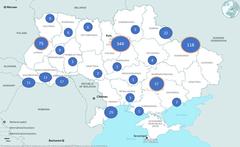URL: https://www.desy.de/news/news_search/index_eng.html
Breadcrumb Navigation
DESY News: EURIZON fellowship programme for Ukraine begins
News
News from the DESY research centre
EURIZON fellowship programme for Ukraine begins
On 1 February, the EU Project EURIZON kicked off its fellowship programme for scientists in Ukraine. These fellowships are designed to help support scientific research in Ukraine, especially during the ongoing Russian invasion. EURIZON is an EU-funded project that involves 27 European research institutes, coordinated by DESY. Their main aim is to encourage collaboration among European research centres and to support research efforts in Ukraine.
Since 1 February, the first batch of 18 fellowships has been up and running, providing individual research grants to 130 Ukrainian scientists and allowing them to keep working on their research projects. The Russian invasion has seriously disrupted scientific work in Ukraine. Funding for scientific projects has been cut or reduced, posing a threat to science. Moreover, attacks have damaged or destroyed education and research facilities in many areas of the country, like the National V.N. Karazin University and the Kharkiv Institute of Physics and Technology, both located in Eastern Ukraine.As a result, many applications for the EURIZON fellowship programme came from the Kharkiv region, with 118 out of 780 total applications originating from there. The programme stands out because fellows must conduct their research in Ukraine, not abroad. Some selected fellows are even willing to return home from other countries where they are temporarily located to participate, which helps prevent the brain drain and strengthens science in Ukraine during the conflict.
DESY, along with the University of Milano-Bicocca in Italy and the Science and Technology Center in Kyiv, Ukraine, are responsible for managing the fellowship programme. When they published the call for proposals in April 2023, they expected around 80 or 100 applications, but they were surprised by the exceptional number of more than 780 proposals submitted.
To accommodate this overwhelming response, the EU Commission tripled the initial budget from 1.5 million to 4.5 million euro. This increase means the opportunity to fund approximately 60 projects involving about 300 scientists. It also required finding hundreds of independent experts to review the applications, as each proposal needed to be assessed twice.
“The EURIZON fellowship programme contributes directly to the consolidation of Ukrainian science,” says Martin Sandhop, who is responsible for international cooperation at DESY. “The grants are destined to individuals, not institutes. With that we could be sure that not a cent would be lost, but rather would arrive where it’s most needed: to scientists in Ukraine.”
All funded projects will involve a direct collaboration between Ukrainian teams and European partners, with the aim to boost the future integration of Ukraine into the broader European research community.
“It is a privilege to contribute to this international endeavour in solidarity with Ukrainian scientists,” says EURIZON fellowship programme manager Greta Facile. “We are really touched by the overwhelming support from the global scientific community, with over 350 scientists from more than 54 countries generously volunteering to assist in our review process. The dedication and resilience of our Ukrainian applicants, who persist in their commitment to science despite the adversity of conflict, serves as a powerful inspiration to us all.”
The first round of evaluations selected 18 projects from diverse scientific fields, ranging from fast scintillators to research on Ukrainian water resources and climate mitigation. These projects teams are spread across various regions in Ukraine, including Lviv, Kyiv, Chernivtsi, Odessa, and Kharkiv. European partners from 34 institutes, including 11 from Germany, are collaborating with the first selected Ukrainian teams, with DESY partnering in one project.
Around 42 more projects will be selected in the coming weeks when the evaluation process will be completed.
EURIZON will continue its activities supporting Ukrainian research until April 2025. This includes providing training for Ukrainian research infrastructure managers and analysing Ukraine’s research infrastructure to identify areas needing urgent support.
For more information on the EURIZON project, visit https://www.eurizon-project.eu/




